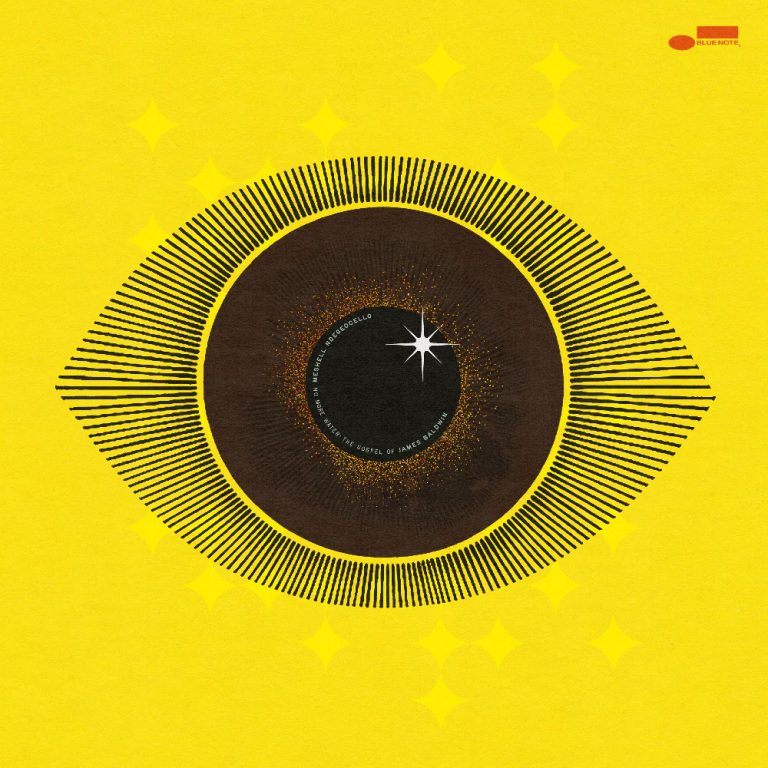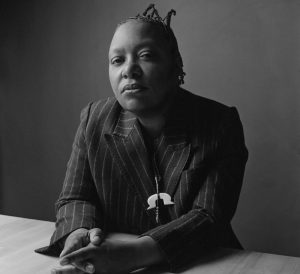Any new album release by the bassist and composer extraordinaire Meshell Ndegeocello is always an event, especially after her Grammy award-winning Blue Note Records debut – “The Omnichord Real Book“.
“No More Water: The Gospel of James Baldwin” is inspired by and based on the work of one of the most legendary writers of a generation. It’s hard to think of a potentially more potent creative collaboration.

MESHELL NDEGEOCELLO No More Water: The Gospel Of James Baldwin
Available to purchase from our US store.An uncompromising contemporary ode to mark the centenary of a don of American literature; James Baldwin, the album’s genesis began almost a decade ago, in 2016, during a performance at The Harlem Stage Gatehouse in New York, as part of their annual showcase honouring Baldwin. Meshell credits Baldwin’s essays, particularly the seminal nonfiction work The Fire Next Time, for giving her a deeper understanding of the fraught history of race and class struggle in America, specifically its lasting impact on her and her family:
“As a Black American, you are devoid of any historical grounding other than what your parents give you.” She says. “This allowed me to really see what my parents went through. Baldwin talks about how the military ruined people. I think that’s the beginning of alcoholism with my father, the beginning of understanding that he would never rise above a certain rank. My mother was a domestic with a fourth-grade education. It just made me see them trying to raise a family, have a marriage, and be individuals in a society that’s been hard-wired for racism, bigotry, and classism.”
‘No More Water’ reflects Baldwin’s mastery of language, mirrored in Meshell‘s mastery of music; the two are distinctly separate but brilliantly complementary. This is church, but not as we know it, a nod to Baldwin’s roots as the son of a Pentecostal preacher. It eddies between prayer & rage; it’s a roof-raising howl of pain, and despair tinged with hopefulness and ‘belief’ – that if people are listened to, things can and will change. It brings to mind Leonard Bernstein’s “Mass: A Theatre Piece for Singers, Players and Dancers” — which uses the Roman Catholic Mass as a framework, in which the celebrant (priest) struggles to make sense of the cultural crisis of the late 1960s and early 1970s,
The album is co-produced by Meshell and guitarist Chris Bruce; and features some of her frequent collaborators: vocalist Justin Hicks, saxophonist (and Omnichord producer) Josh Johnson, keyboardist Jebin Bruni, and drummer Abe Rounds. Also appearing on various songs are vocalist Kenita-Miller Hicks, keyboardists Jake Sherman and Julius Rodriguez, and trumpeter Paul Thompson plus spoken word by venerated poet Staceyann Chin and Pulitzer Prize-winning author and critic Hilton Als.
The opening track, “Travel,” catapults us into an immersive binaural world of swirling see-saw sounds. Initially disconcerting, it is the perfect way to establish the future musical journey ahead of us.
The excoriating “Raise the Roof” features poet Staceyann Chin, who combines her words with that of Baldwin’s and the queer feminist poet and activist Audre Lorde. It challenges us to understand the pain of being black, of being a black woman and mother, ”In a world that has lost its fucking mind.” Declaring her anguish over the continuing impact racism has on raising children in America. “I am holding my own sorrow back from my own child, born black in a country in which her brown body does not matter to anyone with any power.”

The track that follows “The Price of the Ticket” feels like a balm after all the fury, but its soothing mellowness is deceptive, like an iron fist in a velvet glove. “Lord, give me wings to fly…Officer….Put down your gun and take your hands off me.” Meshell says she aimed to write a modern-day anthem of dissent. “Something you could sing at a protest because you don’t need the instruments to sing it.” Reflecting that, “I’ve been at the barrel of a gun… The price of this ticket, of being in this skin, is real.”
The final track, “Down at the Cross,” with its ‘hidden’ message of “page by page, slowly, break the spine,” neatly summarises the album’s overarching mantra.
Baldwin writes in his seminal novel, Sonny’s Blues, “All I know about music is that not many people ever really hear it. And even then, on the rare occasions when something opens within, and the music enters, what we mainly hear, or hear corroborated, are personal, private, vanishing evocations. But the man who creates the music is hearing something else, is dealing with the roar rising from the void and imposing order on it as it hits the air. What is evoked in him, then, is of another order, more terrible because it has no words and triumphant, too, for that same reason. And his triumph, when he triumphs, is ours.”
‘No More Water’ by Meshell Ndegeocello is a triumph. It is a stunning truth-telling odyssey of musical exploration. She follows in the footsteps of Baldwin, making uncomfortable truths accessible. She has composed an album that not only speaks truth to power but also has a groove and rhythm that encourages you to move while keeping the message central and in focus. Dance as you understand what it means to be black, what it means to be female, and what it means to be human. This is an album you should listen to in its entirety, headphones on, to hear its nuances because the journey, although sometimes uncomfortable, is absolutely worth it.
Read on…James Baldwin’s Jazz Gospel
Jumoké Fashola is a journalist, broadcaster, and vocalist who currently presents a range of Arts and culture programmes on BBC Radio 3, BBC Radio 4, and BBC London.
Header image: Meshell Ndegeocello. Photo: Andre Wagner (Courtesy of Blue Note Records).


